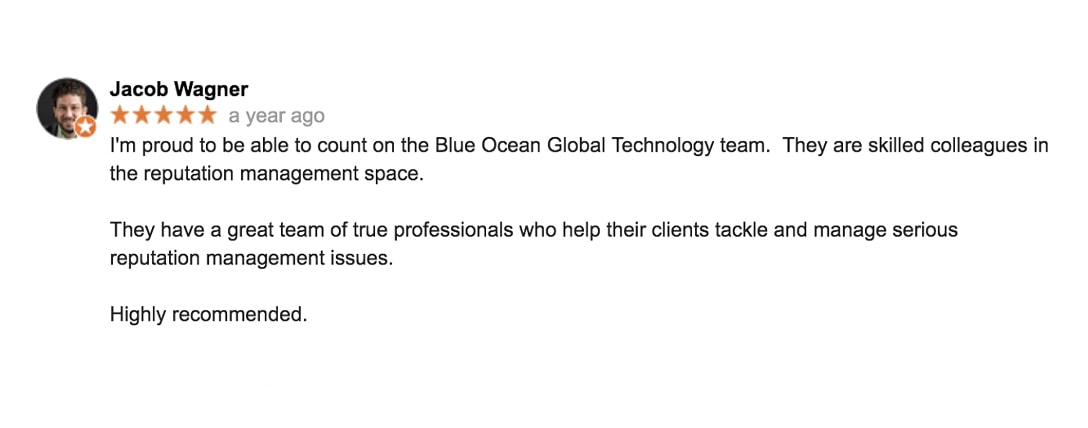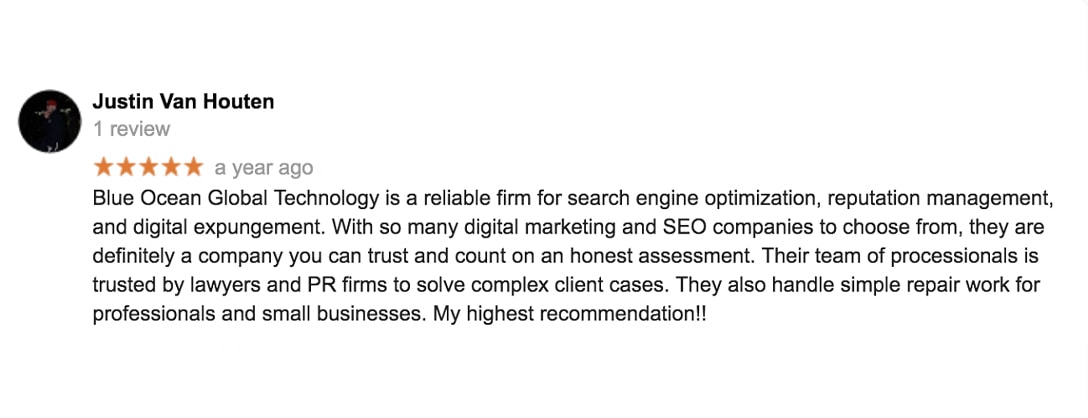Reputation Risk
How We can Help You Protect Your Business ?
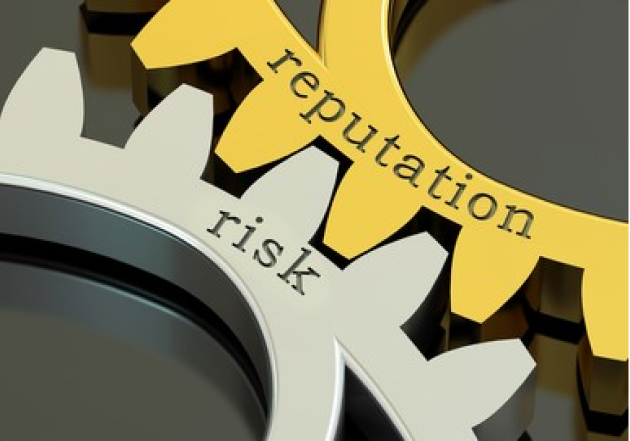
Businesses constantly face risk. If you put out a bad product, accumulate too much debt, or fail to anticipate a change in the market, you put yourself at risk, though there are ways of anticipating, and mitigating, those risks. But how does a company protect against potentially damaging rumors? Or bad reviews? Or malicious people on the internet spreading lies? These kinds of threats fall under the umbrella of Reputation Risk. And if Reputation Risk isn’t one of your top concerns, it should be. Moreover, if you don’t have a partner on your side such as Blue Ocean Global Technology, who is experienced in preventing, navigating, and overcoming such risks, you need to get one. Now.
All businesses today have an online presence, whether they know it or not. This includes your company, even if you don’t want one. People might have reviewed your business on Yelp, posted about it on Glassdoor, or discussed (or defamed) it on any number of websites or blogs, without your even knowing. Word of mouth spreads like wildfire. And Reputation Risk goes hand in hand with having a digital presence.
Reputation Risk (sometimes called Reputational Risk) is the possibility that damage caused to your or your business’s reputation will have a negative impact on your bottom line. The challenge, to be perfectly frank, is knowing exactly what it involves and how it can affect you is difficult. Increasingly, business value is held in intangible assets, such as branding and public perception. As a result, harm done to a company’s reputation can have greater repercussions than ever before. And that risk will only grow as we conduct more and more of our lives online.
Reputation Risk is tied to, though not the same as, Online Reputation Management, which concerns continuously monitoring what is said about you online and managing it for the benefit of your company. Managing Reputation Risk requires assessing the specific ways that damage to your reputation can harm you, analyzing the complex issues surrounding your reputation, and predicting the most likely threats to it.

As Robert G. Eccles, Scott C. Newquist, and Roland Schatz note in Harvard Business Review :
Reputation risk management is not about dealing with the reputation problems you already have—that is crisis management. Reputation risk management is proactive and anticipatory, assessing the potential dangers of various scenarios a business might encounter and preparing strategies for handling those scenarios.

A Preemptive Strike Against Risk
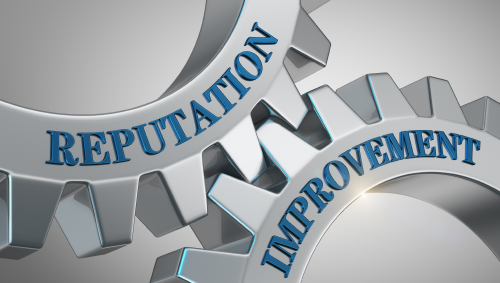
Any thorough assessment of your company’s Reputation Risk will involve taking an honest, sometimes brutal, look at where your company may have opportunities for improvement and therefore where the biggest risks lie. This often ties in closely with public perception; one of the greatest sources of risk is the difference between what people think you are and what you actually are. And bridging that gap can be challenging for a company to do consistently.
Potential Risks To Your Reputation
1Hot Topic Issues:
Sometimes, an otherwise small problem can result in an oversized large hit to a company’s reputation if that problem relates in some way to an issue currently in the news or buzzing across social media. Here are two examples:
Data Breaches

Just the words “data breach” in association with your company can cause major damage, so any such instances must be addressed quickly and disclosed correctly. So many large data breaches have been in the news by now that any business facing a problem with unsecured data could see the public turn against it—permanently.
Ethical Issues

Customers are increasingly making consumer choices based on environmental or social considerations and turning away from companies that fail to meet certain standards. In addition, the public’s definition of what is “ethical” changes over time, sometimes very quickly. Businesses must be able to identify where their old policies and practices might have become lacking or regressive before correcting them.
2Broken Promises:

Risks to your reputation come primarily from the gaps between what is expected of your company and what is actually true. If your company promises to be environmentally sound but doesn’t follow through on that promise, you are at greater risk of eroding trust than a company that made no such promise in the first place. That doesn’t mean you should never make promises, however, just be conscious of not making empty ones.
3Being Reactive:

If your idea of managing Reputation Risk is just dealing with what’s in front of you, you will always be playing catch-up. A company with a comprehensive Reputation Risk strategy will periodically assess the areas where its reputation could be weak or vulnerable and address potential problems before any damage can be done.
An expert consultancy such as Blue Ocean Global Technology is necessary in making an honest, clear assessment. Getting an outsider’s perspective can be an optimal way to accurately understand where you might need help.

The Right Way to Address Risk
Many businesses have thorough, though often complicated, ways of planning for and addressing risk that involve logistics, employee morale and retention, and public relations. The perils of not proactively accounting for Reputation Risk are no different, though they can be much more difficult to contend with directly. Because you are dealing with numerous intangibles such as perception and satisfaction, your strategy should be created in conjunction with a knowledgeable authority. Specialists such as those at Blue Ocean Global Technology can help you focus your reputation efforts exactly where they need to be.
The results of a thorough risk analysis will be different for every company. What is an asset for one company could represent a deficiency for another. But in general, with respect to Reputation Risk, your business should emphasize the following in its strategy:
Prioritizing Intra-company Communication:
Often, the “broken promises” mentioned earlier are neither malicious nor intentional. They generally occur when one department makes a promise (to customers, the media, or even employees) that another department critical to its fulfillment can’t actually meet. One hand doesn’t know what the other hand is doing, so to speak. To reduce this kind of Reputation Risk, every department in a company must be on the same page.

Assigning Leadership:
Somebody must be in charge of managing Reputation Risk—that is a basic fact. Too often, companies place this responsibility on the CEO’s shoulders by default, hand communication to Public Relations, and call it a day. This is not an effective strategy. A leadership position at the executive level must be either created or assigned as specifically in charge of Reputation Risk, and this person must periodically assess anticipated risks and communicate those risks to all concerned parties.

Being Aggressive with the Good, Graceful with the Bad:
All the prep in the world can’t prevent every bad review, silence every rumor, or quash every crisis, but a Reputation Risk strategy can provide clarity about what needs to happen when an issue arises. Even small problems, such as a minor regulatory correction or misinterpretation of a recent comment, can quickly go viral. And being dismissive will only make matters worse. So, be positive. Acknowledge any mistakes. Be magnanimous.
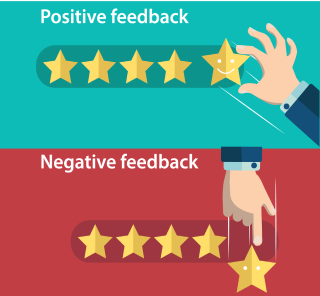
Forgoing Cover-Ups:
No matter how embarrassing or damaging a mistake might be, a company should never try to cover it up or pretend it didn’t happen. Every cover-up attempt is doomed to fail in the internet age. Successfully hiding anything in today’s world is almost impossible, so just take that option off the table. You don’t want your company to be caught in an unethical position, and you certainly don’t want the moral hazard of asking your employees to act unethically—that can engender disloyalty or encourage them to take their concerns to regulators or the press. Both possibilities can destroy a company’s reputation. Be forthright, and the public will appreciate it.

Reputation Risk: How and Why
Blue Ocean Global Technology can assist you in determining the best way to integrate new expectations and responsibilities related to Reputation Risk into your leadership team and your company’s overall policies. Transitioning from a reactionary policy to a proactive one can be challenging, but simply waiting for the next crisis to come along before taking action will lead to wasted time and resources and could leave your reputation nearly as damaged as if you’d done nothing at all. You need to be aware of the most likely risks to your reputation ahead of time.
A good way to evaluate what your risks are is to simply ask. Surveying your stakeholders can throw into stark relief just what threats you’re facing. And of course, solicit your customers for their opinions. But not all risks are related to external reviews. Knowing how your employees honestly feel can reveal internal vulnerabilities. And while your competitors are not likely to respond to a survey from you, examining the dangers those companies face (or where they’ve failed) can help you in developing your Reputation Risk strategy.

Also, informing the public about steps your company is taking to prepare for risk can be useful. In addition, after a crisis, you could release a report on how your business anticipated, or failed to anticipate, the problem. Above all, your company needs to demonstrate that it cares. Perhaps the greatest risk to a company’s reputation in the modern business environment is indifference, so addressing this shortcoming must be part of your overall strategy.
Blue Ocean Global Technology is the best partner you could find for support and guidance in creating and implementing your Reputation Risk strategy.
Conclusion
So, why go through all this trouble? Simple, the bottom line. Companies with strong, positive reputations foster customer loyalty with those who are often willing to pay a premium to be associated with them. Having a favorable reputation also helps businesses attract more clients, retain talented employees, and such companies are perceived to be more valuable and worthwhile overall. Who wouldn’t want all that?
Reputation Risk can feel a little overwhelming. And because it involves perception and planning into the future, it can perhaps feel too remote to worry about. Many companies still haven’t made the connection between how damage to their reputation can hurt profits. But this happens all the time, to companies both large and small. And the risks that come with having a digital presence will only increase in number and scope over the next decade. Blue Ocean Global Technology is the best partner you could find for support and guidance in creating and implementing your Reputation Risk strategy. Its experts have the experience and knowledge necessary to be able to protect you and your company, now and far into the future.

